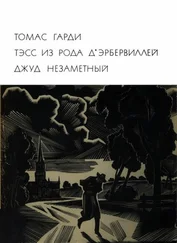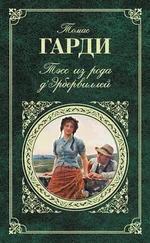| So spoke love renascent, preparing the way for Tess's devoted outpouring, which was then just being forwarded to him by his father; though owing to his distance inland it was to be a long time in reaching him. |
Так вещала возрождающаяся любовь, расчищая путь для смиренных излияний Тэсс, которые были только что отправлены Клэру его отцом; но из-за дальности расстояния они не скоро могли быть услышаны. |
| Meanwhile the writer's expectation that Angel would come in response to the entreaty was alternately great and small. |
Между тем надежды Тэсс на возвращение Энджела в ответ на ее мольбу то разгорались, то угасали. |
| What lessened it was that the facts of her life which had led to the parting had not changed-could never change; and that, if her presence had not attenuated them, her absence could not. |
Г асли они потому, что в обстоятельствах, приведших к разлуке, никаких изменений не произошло - не могло произойти, а если искупление не пришло, когда она была с ним, тем более не могло это случиться в ее отсутствие. |
| Nevertheless she addressed her mind to the tender question of what she could do to please him best if he should arrive. |
Однако она все время думала о том, как бы ему понравиться, если он вернется. |
| Sighs were expended on the wish that she had taken more notice of the tunes he played on his harp, that she had inquired more curiously of him which were his favourite ballads among those the country-girls sang. |
Она сожалела, что не постаралась запомнить те мелодии, какие он играл на арфе, не выпытала у него, какие баллады, распеваемые деревенскими девушками, он любит. |
| She indirectly inquired of Amby Seedling, who had followed Izz from Talbothays, and by chance Amby remembered that, amongst the snatches of melody in which they had indulged at the dairyman's, to induce the cows to let down their milk, Clare had seemed to like |
Она осторожно расспрашивала об этом Эмби Сидлинга, который приехал вслед за Изз из Тэлботейс, а Эмби случайно запомнил, что из тех песенок, какие распевали они на мызе, чтобы легче было доить коров, Клэр, казалось, отдавал предпочтение |
| "Cupid's Gardens", |
"В саду Купидона", |
| "I have parks, I have hounds", and |
"Есть у меня парк, есть у меня гончие" и |
| "The break o' the day"; and had seemed not to care for |
"На рассвете", но равнодушно выслушивал |
| "The Tailor's Breeches" and |
"Брюки портного" и |
| "Such a beauty I did grow", excellent ditties as they were. |
"Какой я выросла красоткой", хотя это и прекрасные песенки. |
| To perfect the ballads was now her whimsical desire. |
Теперь Тэсс хотелось петь эти баллады как можно лучше. |
| She practised them privately at odd moments, especially |
Частенько она распевала их, когда оставалась одна, - в особенности |
| "The break o' the day": |
"На рассвете": |
| Arise, arise, arise! And pick your love a posy, All o' the sweetest flowers That in the garden grow. |
Проснись, проснись, проснись, □ ПИ милочке своей □□ Нарви букет цветов - ППТех, что в саду растут. |
| The turtle doves and sma' birds In every bough a-building, So early in the May-time At the break o' the day! |
Все горлинки, смотри, □ ПВьют гнезда на ветвях □ □Весеннею порой ППНа утренней заре. |
| It would have melted the heart of a stone to hear her singing these ditties whenever she worked apart from the rest of the girls in this cold dry time; the tears running down her cheeks all the while at the thought that perhaps he would not, after all, come to hear her, and the simple silly words of the songs resounding in painful mockery of the aching heart of the singer. |
Даже камень и тот был бы растроган, когда пела она эти песни холодной ранней весной, если случалось ей работать в стороне от других девушек. Слезы струились у нее по щекам; она думала, что, наверное, он все-таки не приедет и не услышит ее, и простые глупые слова песни звучали как насмешка, терзая ее измученное сердце. |
| Tess was so wrapt up in this fanciful dream that she seemed not to know how the season was advancing; that the days had lengthened, that Lady-Day was at hand, and would soon be followed by Old Lady-Day, the end of her term here. |
Погруженная в мечты, Тэсс словно не замечала, что время идет, дни становятся длиннее, и благовещенье, когда окончится срок ее пребывания на ферме, уже не за горами. |
| But before the quarter-day had quite come, something happened which made Tess think of far different matters. |
Но до благовещенья произошло событие, которое направило ее мысли в другую сторону. |
| She was at her lodging as usual one evening, sitting in the downstairs room with the rest of the family, when somebody knocked at the door and inquired for Tess. |
Однажды вечером она сидела, по обыкновению, в общей комнате вместе с хозяевами, когда кто-то постучал в дверь и спросил, здесь ли Тэсс. |
| Through the doorway she saw against the declining light a figure with the height of a woman and the breadth of a child, a tall, thin, girlish creature whom she did not recognize in the twilight till the girl said "Tess!" |
На фоне сумеречного неба вырисовывалась в дверях высокая фигура - ее можно было принять за взрослую женщину, не будь она худенькой и тонкой, как ребенок. В сумерках Тэсс не узнала пришедшую, пока та не назвала ее по имени. |
| "What-is it 'Liza-Lu?" asked Tess, in startled accents. |
- Как, это ты, Лиза Лу? - удивилась Тэсс. |
| Her sister, whom a little over a year ago she had left at home as a child, had sprung up by a sudden shoot to a form of this presentation, of which as yet Lu seemed herself scarce able to understand the meaning. |
Сестра ее, которую год с небольшим она оставила ребенком, вдруг выросла, как на дрожжах, стала девушкой, но вряд ли сама понимала происшедшую с ней перемену. |
| Her thin legs, visible below her once-long frock, now short by her growing, and her uncomfortable hands and arms revealed her youth and inexperience. |
Юбка, когда-то длинная, была ей теперь коротка, а тонкие ноги и руки, которые она не знала куда девать, красноречиво свидетельствовали о ее молодости и неопытности. |
| "Yes, I have been traipsing about all day, Tess," said Lu, with unemotional gravity, "a-trying to find 'ee; and I'm very tired." |
- Да, Тэсс, я целый день шла пешком, - сказала Лу с невозмутимой серьезностью, - старалась отыскать тебя и очень устала. |
| "What is the matter at home?" |
- Что случилось дома? |
| "Mother is took very bad, and the doctor says she's dying, and as father is not very well neither, and says 'tis wrong for a man of such a high family as his to slave and drave at common labouring work, we don't know what to do." |
- Матери очень плохо, доктор сказал, что она умирает. Да и отец тоже плох; и он все говорит о том, что не годится человеку из такой знатной семьи работать не покладая рук, как простому крестьянину. Вот мы и не знаем, что нам делать. |
| Tess stood in reverie a long time before she thought of asking 'Liza-Lu to come in and sit down. |
Тэсс так глубоко задумалась, что не сразу догадалась позвать Лизу Лу в дом. |
| When she had done so, and 'Liza-Lu was having some tea, she came to a decision. |
Усадив ее и напоив чаем, она приняла наконец решение. |
| It was imperative that she should go home. |
Ей необходимо вернуться домой. |

![Томас Вулф - Взгляни на дом свой, ангел [английский и русский параллельные тексты]](/books/32195/tomas-vulf-vzglyani-na-dom-svoj-angel-anglijskij-thumb.webp)
![Агата Кристи - На краю [английский и русский параллельные тексты]](/books/32247/agata-kristi-na-krayu-anglijskij-i-russkij-paralle-thumb.webp)
![Сакс Ромер - Ведьмино отродье [английский и русский параллельные тексты]](/books/33237/saks-romer-vedmino-otrode-anglijskij-i-russkij-thumb.webp)
![Агата Кристи - Объявлено убийство [английский и русский параллельные тексты]](/books/33247/agata-kristi-obyavleno-ubijstvo-anglijskij-i-russ-thumb.webp)
![Фрэнсис Фицджеральд - По эту сторону рая [английский и русский параллельные тексты]](/books/34130/frensis-ficdzherald-po-etu-storonu-raya-anglijskij-thumb.webp)

